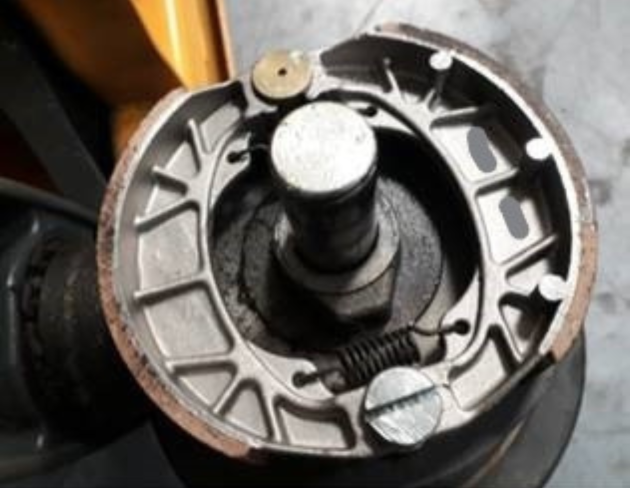Asbestos in the Brakes of Manual Hand Pallet Trucks
Purpose
This safety alert provides information about the potential presence of asbestos in the brake shoes of manual hand pallet trucks imported from the People’s Republic of China (China).
Background
In May 2020, the Australian Competition and Consumer Commission were alerted to the presence of chrysotile asbestos in the brake shoes of manual hand pallet trucks, and manual high-lift pallet trucks, imported between 2009 and 2015. This information related to the wheel systems supplied from China to an overseas manufacturer of pallet trucks and then imported into Australia. Users of the identified equipment in Australia have been contacted as part of a recall by the importer, for removal of the affected brakes. It is possible that other manual hand pallet trucks with identical brake systems originating in China, contain asbestos.
Product description
A manual hand pallet truck (or pallet jack) is a hand operated forklift with a hydraulic system used to move, lift and lower pallets, typically in a warehouse environment. The pallet truck is steered by a wheel at the rear, controlled by tiller-like hand lever which also serves as the pump handle for raising the forks, while a small handle on the lever is pulled to lower the forks. The affected mechanism is a tiller parking brake system with fully enclosed brake shoes within the wheel assembly. Asbestos was located in the brake lining of the shoes as shown.

Figure 1: Uncovered brake assembly of an affected manual hand pallet truck
Asbestos in imported products
While asbestos has been prohibited in Australia since December 2003, in some countries it is still used in manufactured products. Certification of asbestos-free goods from some overseas manufacturers have been found not to meet Australian requirements. The importation, manufacture, supply, sale and use or reuse of asbestos and asbestos-containing products is not permitted, except under very limited circumstances. Some supplier countries may classify goods with low levels of asbestos as ‘asbestos-free’. In Australia, any level of asbestos is prohibited for import or use.
Risk control
The design of these types of manual hand pallet trucks typically negates the need for maintenance during the life of the equipment. During normal and proper use, there should be no discharge of asbestos as the brake shoes are fully enclosed. However, if the brakes are repaired, serviced or replaced, there is a risk of exposure to asbestos during the disassembly of the brake shoes. Owners or users of Chinese manufactured manual hand pallet trucks that have concerns about their equipment are advised not to undertake any maintenance, repairs or modifications of the wheels. They should contact the Australian supplier for clarification and/or seek the guidance of an asbestos professional.
Action Required
- Importers must ensure they do not import asbestos into Australia. They should be aware of the varying definitions and standards applied in the country of origin and/or supply. Australian regulations apply at the border.
- When a risk is identified at the border, the Australian Border Force (ABF) will require assurance from the importer, in the form of documentary evidence, that the goods do not contain asbestos. A test report from a NATA accredited laboratory (or equivalent international laboratory) showing no detectable asbestos is the best form of assurance. If adequate assurance is not provided, suppliers will face delays and be responsible for costs incurred when the goods are held at the border for the purposes of sampling and testing. More information is on the ABF website.
- If a consumer wishes to dispose of equipment they believe may contain asbestos, they should take it to a licensed facility that handles hazardous waste. Further information on the disposal of asbestos waste may be obtained from local government authorities, the relevant environmental protection authority or waste disposal authority in your state or territory.
Where do I get advice?
If unsure what to do, contact your State/Territory/Commonwealth WHS regulator:
| Jurisdiction | Regulator | Contact Details | Website |
| C’wealth | Comcare | 1300 366 979 | www.comcare.gov.au/ |
| QLD | Workplace Health and Safety Qld | 1300 362 128 |
|
| QLD | QLD Gov Asbestos page | 13 74 68 | www.asbestos.qld.gov.au/ |
| ACT | WorkSafe ACT | 02 6207 3000 | www.worksafe.act.gov.au/ |
| ACT | ACT Gov Asbestos page | 13 22 81 | www.asbestos.act.gov.au/ |
| NSW | Safework NSW | 13 10 50 | www.safework.nsw.gov.au/ |
| NSW | NSW Gov Asbestos page | 13 10 50 | www.asbestos.nsw.gov.au/ |
| NT | Worksafe NT | 1800 019 115 | www.worksafe.nt.gov.au/ |
| NT | NT Gov Asbestos page | 1800 019 115 | www.asbestos.nt.gov.au/ |
| SA | SafeWork SA | 1300 365 255 | www.safework.sa.gov.au/ |
| SA | SA Gov Asbestos page | 1300 365 255 | www.asbestos.sa.gov.au/ |
| TAS | Worksafe TAS | 1300 366 322 | www.worksafe.tas.gov.au/ |
| VIC | Worksafe VIC | 1800 136 089 | www.worksafe.vic.gov.au/ |
| VIC | Vic Gov Asbestos page | 1800 136 089 | www.asbestos.vic.gov.au/ |
| WA | WorkSafe WA | 1300 307 877 | www.commerce.wa.gov.au/WorkSafe |
This Alert has been developed by the Heads of Workplace Safety Authorities (HWSA) Imported Materials with Asbestos Working Group, whose membership comprises representatives from: Australian Border Force, Asbestos Safety and Eradication Agency, Attorney General’s Department, Australian Competition & Consumer Commission, Comcare, Safe Work Australia, SafeWork NSW, SafeWork SA, NT WorkSafe, Workplace Health and Safety Queensland, WorkSafe ACT, WorkSafe Tasmania, WorkSafe Victoria and WorkSafe WA.


